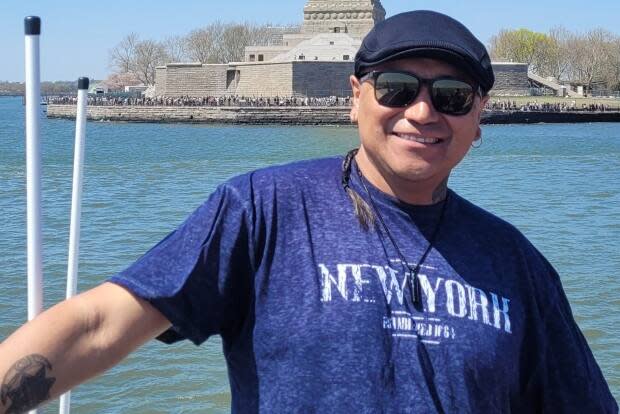Sask. First Nation man builds Dene computer keyboard to help others to learn the language

A man from a northern Saskatchewan First Nation has built what he believes is the world's first specialized Dene language computer keyboard, in hopes of making the Indigenous language more accessible.
"There was no keyboard for me to use to type my language," said Chevez Ezaneh, who is from English River First Nation.
"It initially started off as a hobby — I just wanted a keyboard to make the language more accessible. After I made the first keyboard prototype, I realized this is something that other people want as well," he told CBC Radio's The Morning Edition host Stefani Langenegger.
While there are apps and software keyboards that allow people to type in Indigenous languages, Ezaneh believes his physical Dene keyboard is a first.
The Dene keyboards are now being used in the Common Weal Community Arts project to inspire more youth at the St. Louis School in Patuanak — about 425 kilometers northwest of Saskatoon — to learn the language.
Ezaneh says so far, it seems to be working.
"I was amazed at how quickly they got the hang of it. Within, like, 10 minutes they had kind of figured it out."

His mother, Michèle Mackasey, features Dene engravings through her work as the lead artist for the Common Weal Community Arts project.
Mackasey says the project aims to combine art and technology to help Dene language revitalization efforts.
"It's a fun way to get kids to participate," Mackasey said. "I think the whole idea of the project was really trying to get kids interested in using it and learning how to write their language."
Mackasey added that the kids are also learning the language through handwriting and engaging with elders.
Technology important in language revitalization
Statistics Canada 2021 census data says the number of people who could speak Dene in Saskatchewan dropped nearly eight per cent since 2016.
All Indigenous languages spoken in Canada are considered at risk, according to the UNESCO Atlas of World Language.
Randy Morin, who focuses on Indigenous language revitalization and reclamation through his work as an assistant professor in the University of Saskatchewan's department of Indigenous studies, says technology plays an important role revitalizing Indigenous languages.
The decline in fluency for Indigenous language is steepest among younger people, he says.
"Indigenous languages are oral languages — that's just how we did things, we never really wrote things down, " Morin said.
"But in today's day and age, because of our elders passing away, we need to preserve their stories, teachings, songs, wisdom, and we have to do that now using technology."

Morin says having keyboards in Indigenous languages can help people learn them. He would like to see them implemented in cellphones and tablets.
"We're trying to standardize our languages because a lot of people still speak the languages, but they don't know how to read or write it," Morin said.
"Having a keyboard is really good because it has special characters that can help them type out their language and help them learn."
Morin says he is optimistic about Indigenous language revitalization as the number of people that can speak them as a second language is on the rise in Canada, but there needs to be more support from governments and schools.
"We need to reawaken the languages, we need to revitalize them and reclaim them as our own, but the danger there is we lose a unique perspective on the world when we lose the language," Morin said.
"Indigenous people have knowledge systems that can really help the world, especially with climate change, pollution, resource management, water management and all that stuff."
Morin added that he would like to see Indigenous languages designated as official languages of Canada.
Plans to build more keyboards
Ezaneh has created a Plains Cree keyboard in addition to his Dene keyboard. And he doesn't want to stop there.
"My hope is to continue developing this work locally to get the rest of the Indigenous languages in Saskatchewan up to date, with having access to their language through technology, " Ezaneh said.
"The next would be Dakota, Nakota and Lakota. That looks like it is going to be one keyboard all in one."
LISTEN | Technology meets art to inspire reclmation of Dene language:
Ezaneh would like to receive funding to build the keyboards because he currently works on the projects in his spare time.
"If I had funding for it, I could develop it full time and hopefully get keyboards for all the Indigenous languages in Canada."


